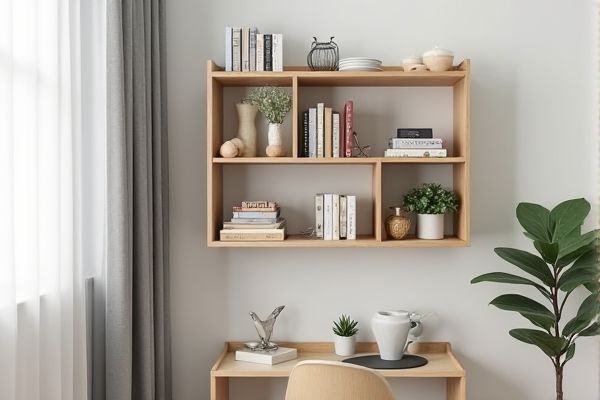
A hanging shelf organizer maximizes vertical space by providing multiple compartments suspended from a closet rod, ideal for lightweight items, while a cube organizer offers sturdy, freestanding storage with larger, open compartments suited for bulkier belongings. Discover which option best fits your storage needs and transforms Your space by reading the rest of the article.
Table of Comparison
| Feature | Hanging Shelf Organizer | Cube Organizer |
|---|---|---|
| Design | Fabric shelves hung from a rod or hook | Rigid cubes made of wood, plastic, or fabric |
| Installation | Easy to hang in closets or wardrobes | Requires floor or tabletop placement |
| Space Usage | Vertical space-saving solution | Utilizes floor or shelf space |
| Capacity | Best for lightweight items like clothes or accessories | Suitable for heavier items and bulk storage |
| Mobility | Portable and easy to move | Heavier and less portable |
| Durability | Less durable due to fabric materials | More durable with rigid construction |
| Price Range | Affordable, typically $10-$30 | Varies widely, typically $20-$100+ |
| Best Use Case | Closet organization, small spaces | Living rooms, kids' rooms, heavy storage |
Introduction to Hanging Shelf Organizers and Cube Organizers
Hanging shelf organizers offer a space-saving solution by utilizing vertical space through hooks or straps to hang in closets or on doors, making them ideal for storing shoes, accessories, or small household items. Cube organizers provide flexible, modular storage with stackable compartments, perfect for organizing books, toys, or folded clothes in bedrooms and living areas. Both options enhance your home organization by maximizing available space while catering to different storage needs and room layouts.
Design and Structure Comparison
Hanging shelf organizers feature a vertical design with fabric or lightweight shelves that hang from a closet rod, maximizing vertical space and offering easy access to items. Cube organizers are typically made from sturdy materials like wood or reinforced fabric, providing fixed, box-shaped compartments that support heavier items and maintain shape over time. The choice between the two depends on the need for portability and space-saving versus durability and heavier load capacity.
Space Optimization Capabilities
Hanging shelf organizers maximize vertical space by utilizing closet rods or door frames, making them ideal for small rooms or tight closets where floor space is limited. Cube organizers provide flexible, modular storage that can be arranged in various configurations to accommodate larger items and can double as display units, but typically require more floor or shelf space. Your choice depends on whether you prioritize vertical space efficiency or versatile, accessible storage options.
Material and Durability Differences
Hanging shelf organizers typically use lightweight, breathable materials like fabric or mesh, offering moderate durability suitable for lighter items. Cube organizers are often constructed from sturdier materials such as wood, plastic, or reinforced fabric, providing enhanced durability and support for heavier belongings. Material composition directly impacts the longevity and load-bearing capacity, making cube organizers more suitable for long-term or heavy-duty storage needs.
Ease of Installation and Setup
Hanging shelf organizers offer superior ease of installation by requiring only a few hooks or straps, making them ideal for quick setup without tools. Cube organizers often involve assembling multiple panels and connectors, which can be time-consuming and may require an extra set of hands. Your choice depends on whether you prioritize fast, tool-free installation or a more stable, structured storage solution.
Versatility and Usage Scenarios
Hanging shelf organizers offer exceptional versatility for small spaces, ideal for closets, laundry rooms, and dorms where vertical storage maximizes area without floor clutter. Cube organizers provide customizable and sturdy storage, perfect for living rooms, offices, and children's rooms, supporting heavier items like books and decorative pieces. Choosing between the two depends on specific usage scenarios requiring either lightweight flexibility or robust compartmentalized storage.
Maintenance and Cleaning Requirements
Hanging shelf organizers require less frequent cleaning due to their suspended design, which prevents dust accumulation compared to cube organizers that often have flat surfaces prone to collecting dirt. Cube organizers, typically made of fabric or wood, may demand periodic dusting, spot cleaning, or fabric washing to maintain hygiene. Both designs require easy maintenance when materials like plastic or metal are used, but hanging shelves offer better airflow, reducing moisture buildup and mold risk.
Aesthetic Appeal and Home Décor Compatibility
Hanging shelf organizers offer a sleek, vertical storage solution that blends seamlessly with modern and minimalist home decor, enhancing room aesthetics without occupying floor space. Cube organizers provide a versatile and visually appealing option, often featuring customizable grids that complement eclectic and contemporary interiors by showcasing decorative items alongside storage. Both options elevate organizational style, but hanging shelves emphasize clean lines and subtle integration, while cube organizers serve as statement pieces with multifunctional charm.
Cost and Budget Considerations
Hanging shelf organizers generally offer a more affordable solution with prices ranging from $10 to $30, fitting tight budgets and small spaces. Cube organizers tend to be pricier, often costing between $50 and $150, but provide sturdier storage and greater capacity for heavier items. Choosing between the two depends on balancing budget constraints against storage needs and durability requirements.
Choosing the Right Organizer for Your Needs
Choosing between a hanging shelf organizer and a cube organizer depends on your available space and storage needs. Hanging shelf organizers are ideal for maximizing vertical space in closets or small rooms, offering multiple compartments for lightweight items. Cube organizers provide sturdy storage and versatility, perfect for heavier items or open display in living areas, helping you maintain an organized and clutter-free environment tailored to your lifestyle.
 homyna.com
homyna.com